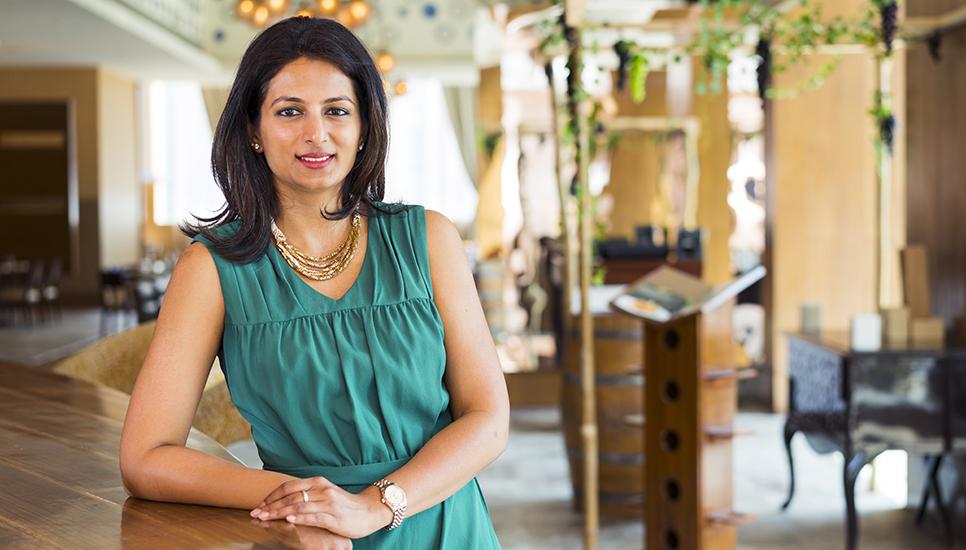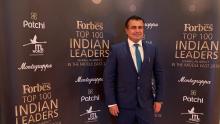Nirupa Shankar: The art of learning by doing

The second-gen leader of leading Indian property developer Brigade Group, Nirupa Shankar has been a driving force in the firm’s growth and expansion since she first came on board 14 years ago.
Always with one eye on the future, she set up Asia’s first real estate accelerator, Brigade Real Estate Accelerator Program (REAP), to mentor high-tech start-ups in real estate. All the while, she has had an ‘entrepreneurial bug’ that has seen her successfully branch out into hospitality outlets and flexible workspaces.
A graduate of the University of Virginia (with a bachelor’s in economics) and Cornell University (with a Master of Management in hospitality), Nirupa has won multiple awards and has been recognised by CNBC as a Young Turk and one of the Economic Times’ 40 under 40.
Ahead of chairing the 9th Indian Families in Business Forum, taking place on April 30 in Mumbai, India, Nirupa talks about making her mark in business, honouring family values and preparing for her home country’s ‘golden decade’…
As chair of Campden Family Connect’s 9th Indian Families in Business Forum, what are you personally hoping to get out of the event?
We are, at our core, a real estate company and most of our investments go into our business. We are fairly new to managing our family office by a 3rd party professional;, hence. my interest in the forum is to understand what other family offices are doing. I look forward to it as a learning opportunity for myself, through the sharing of opinions and perspectives.
The forum’s theme, ‘Getting future ready – shaping the next decade,’ highlights the importance of preparedness for long-term success. How do you believe family businesses can best prepare themselves to navigate modern-age challenges and opportunities?
When we think about preparing for the future, we have to think about how our industry will look ten years from now and then work backwards. We have to think about how to stay ahead of the curve and how to prepare for the future.
For me, all the solutions point towards technology. Seven years ago, we set up an accelerator to look at technology in our core real estate business. We hired a full team, with a different skill to run an incubator / accelerator for tech in the real estate space. We mentor about ten startups every year, and they give us equity in lieu of acceleration services. This helps us keep our ears to the ground in terms of understanding what new technologies are coming up in our space.
Sector disruption comes from outside the business. If you’ve been in the business for the past 30-40 years, you tend to do things the way they’ve always been done. For us, it’s very important to work with external startups and how young entrepreneurs are thinking about disrupting the space.

You’ve taken on significant responsibilities within Brigade Group, overseeing diverse portfolios, such as hospitality, office and retail. How do you balance the demands of these different sectors while maintaining the core values of your family business?
The core values of our business is the foundation of how we run the business. It’s ‘QC FIRST’, which stands for ‘Quality and Customer-centricity’ and ‘Fairness, Innovation, Responsible Socially and Trustworthiness’. We’ve been in this business for 37 years running it on the basis of our value system. There is a zero-tolerance policy when it comes to integrity, as this is key to our reputation as a trustworthy developer.
We do a lot on the CSR front as being “responsible socially” is another core value. When we look at our CSR spend, we try to invest it on legacy projects that will stay far beyond our time. This includes building charitable hospitals, rejuvenating lakes and parks, planting 60,000+ trees etc.
Our chairman is also very passionate about music, and we’ve created India’s First Music Experience Museum. It’s one of a kind in this country and is affiliated with the Grammy Museum.
We look at three major pillars for our foundation called “The Brigade Foundation.” They are Education, Health and Community Development.
Fairness is a tenet of how we operate daily. Whether it’s to our customers or employees, it’s vital that we are fair in our dealings. When it comes to our daily management of multiple verticals, I allocate specific time per week for each of the business’ verticals. My days are very packed, and everything is scheduled; Mondays and Tuesdays are for internal reviews and, and Wednesday, Thursday and Friday are usually for travel to sites and for more strategy-based work.
People always ask me, as a woman, how do you manage in a male-dominated sector and I say, ‘I’m not here to manage it, I’m here to disrupt it’.
As a serial entrepreneur, you have successfully set up multiple award-winning hospitality outlets, such as HIGH Ultra Lounge and Glass Kitchen & Bar in Bangalore. What is it about the food & beverage sector that interests you?
I went to Cornell Hotel School, and the first seven years of my career were in hospitality. I’ve always had this little question in me that asks, ‘What would I have done if I didn’t have this family business? Would I be just as successful?’ I have a bit of a chip on my shoulder to prove to myself that I am the best person for the job. I think this is a common feeling amongst second-and-third-gen entrepreneurs.
I launched two food and beverage outlets because, frankly, nobody else in the market wanted to take those spaces as they thought it wouldn’t work. I said, ‘You know what, I’m going to take those two spaces and make sure they’re commercially successful’.
I like conceptualising new ideas, I like starting things from the ground, setting it up, operating it successfully and then handing it over to professionals to manage.
I set up BuzzWorks which is Brigade’s flexible co-working space brand. I also set up Asia’s first real estate accelerator programme, Brigade REAP, as again nobody in the country was investing in finding tech solutions for the real estate business.
People always ask me, as a woman, how do you manage in a male-dominated sector and I say, ‘I’m not here to manage it, I’m here to disrupt it’. So the idea is to see how to disrupt and do things differently in an industry that hasn’t seen much disruption for decades, I also feel that the Construction Industry has a negative impact on our environment. Hence have launched the country first Real Estate Tech Fund that is focused on finding sustainable solutions for the built world. It is called the Earth Fund and is a SEBI registered CAT II AIF fund. We are in the midst of fund raising and hope to complete First Close soon.
You’ve demonstrated remarkable resilience and determination, evident in your completion of the Ironman in Copenhagen. How do personal achievements like this contribute to your leadership approach within the family business, and what lessons do you draw from such experiences that are applicable to business challenges?
When I signed up to do the Ironman, my dad asked me ‘What are you trying to prove?’ I said, ‘I’m not trying to prove anything, The gift of Fitness is the best gift I can give my 40 year old self.’
While my endurance athlete journey started off as health-focused running, doing one sport daily can get quite boring. So I added swimming and cycling to the mix. Cycling came in mostly during the Covid pandemic lockdown when the roads were free.
I like challenges and I like doing difficult things. and I feel like doing something like the Ironman gives you a lot of street cred because you can’t buy fitness, you can’t get it handed down to you. You have to earn it. I feel that a lot of people respect that.
When one takes on challenges and consistently does difficult things, that drive and confidence translates into the business world, Hence, I have never shied away from doing something because it’s hard.
Mentorship and guidance play a crucial role in grooming the next generation of leaders. How has your father, Mr. Jaishankar, influenced your leadership style and approach to decision-making within the company?
Very early in my career, I had the choice of working with the residential side of the business, which accounted for most of the company’s revenue.
At the time, office, retail and hospitality were much smaller portion of the business. I decided to go specifically into the hospitality business, which then accounted for around 5% of the top line, because I felt that I could make my own decisions and learn from them.
I don’t tend to learn by observing, I learn by doing. For instance, if I am chauffeur-driven somewhere, I won’t remember the route. But if I actually drive myself, that’s when I remember the route. So my style of learning is by doing and I think I understood that very early on in life.
I thought to myself, I’d rather just have a role in the hospitality business where I can take decisions. And it’s okay if I make a mistake’. I learned by giving myself the freedom to fail.
If I got stuck, I would then seek mentorship from my father. But I would never go to him with only the problem. I would always go to him with a problem and my own solution, and then I would see if he agreed with it or not… That’s the only mentorship I’ve actually sought.

Looking ahead, what are your aspirations for Brigade Group, both in terms of business growth and impact on society?
Right now, the idea is to scale. We are already amongst the top 10 builders in the country. India is looking at a really golden decade, I think all the economic factors point towards a very rosy next ten years.
Of course, there are various growth targets. One is to see how we can grow at scale, while automating a lot of our processes, making it less person-dependent and more process-dependent, all while ensuring that we keep our core values intact.
Additionally, I want to be the best from a customer perspective. Real estate is not an industry that typically has the best reputation with customers, because people are putting in their life savings are not very tolerant of delays and mistakes. I want to have the highest percentage of customer referrals from our existing customers.
In terms of my personal growth, I would like to take on less of an operational role and focus more on strategy, long-term growth and customer and client relationships. I would like to have the professionals working in the company to grow into the C-suite roles
The forum aims to foster networking and collaboration among family business leaders. From your perspective, what role does collaboration play in driving innovation and sustainability within the family business ecosystem, and how can family businesses leverage these networks for mutual benefit?
I think it’s very important because we have to learn from each other. Nobody has everything figured out and I feel there’s a lot of potential for cross learning. One family business might be good at a particular aspect, and others could be good at another aspect, hence it’s always good to learn from each other and bring in different perspectives.
I think networking and relationship development is probably the most important aspect of a leadership role. . This forum, I’m sure, will have a lot of cross learning and will create an ecosystem for open and honest cross learning.






